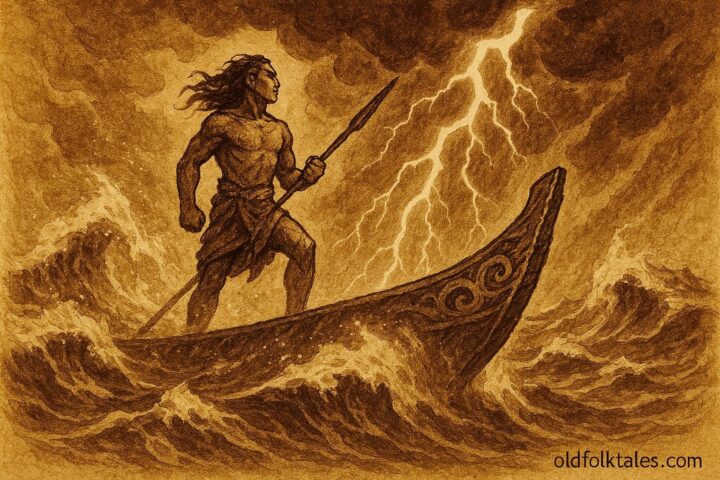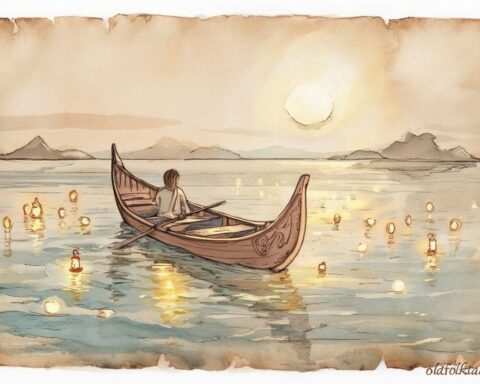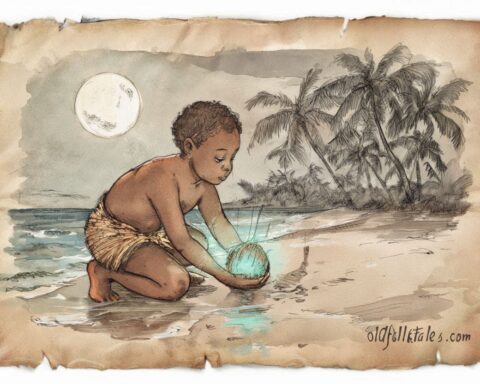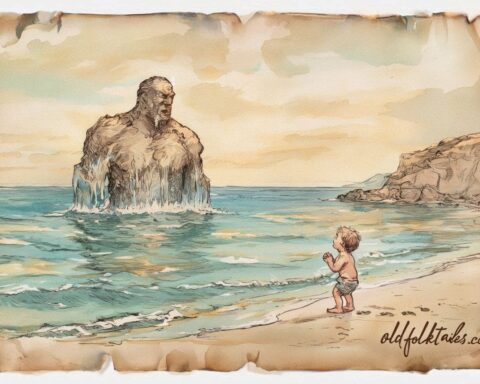When the world was young and the sea still hid its treasures, the demigod Māui-tikitiki-a-Taranga was the smallest of his brothers but the boldest in heart. His older brothers were great fishermen, bringing back shimmering tuna and snapper each day, but they mocked Māui as too small to hold an oar.
One morning they paddled away without him, laughing as the mist closed behind their canoe. But Māui was clever. He hid beneath the floorboards, silent as a shadow. Only when they were far beyond the reef did he emerge.
His brothers shouted, “You will bring us bad luck!”
“Then let me earn your forgiveness,” Māui said, his eyes glinting. “I will fish something greater than any of you have seen.”
From his belt he drew his grandmother’s jawbone, carved with runes and bound in sinew. It was no ordinary bone — it held the mana of ancestors and the favor of the sea god Tangaroa.
Māui baited it with his own blood and cast it deep into the dark. The hook sank until it caught something immovable. The canoe lurched.
“Cut the line!” his brothers cried.
But Māui braced his feet and pulled with all his might. He chanted ancient karakia (prayers) that shook the waves. From beneath the sea came a trembling, a grinding of stone and coral. Then, slowly, land rose from the deep — mountains, valleys, and forests dripping with foam.
Māui laughed. “Behold! My catch — Te Ika a Māui, the Fish of Māui!**”
But his brothers, greedy and afraid, hacked at the land to claim their shares. Where their axes fell, the earth split into hills and cliffs. Thus Aotearoa took its shape — a rugged land of ridges and gorge.
When Tangaroa saw what they’d done, he roared beneath the waves. Māui hung his head. “I meant to bring life,” he said. “Not wounds.”
The sea god answered, “Creation and destruction are brothers. From your hook rose beauty; from their greed came warning.”
So it was that the North Island became Te Ika a Māui — the Fish of Māui — and the South Island his canoe. His jawbone became the symbol of divine skill and sacrifice, forged in blood and wisdom.
And even now, when earthquakes shake the islands, elders say the fish still thrashes, and Māui tugs the line once more.
Moral of the Story
Creation comes with responsibility. Power used for selfish gain turns blessing into burden.
Knowledge Check
- What did Māui use as a fishhook?
His grandmother’s sacred jawbone, charged with mana. - What did he catch with it?
The great fish that became the North Island of New Zealand. - How did the land gain its mountains and valleys?
Māui’s brothers attacked the fish out of greed, scarring the earth. - Which god watched from the sea?
Tangaroa, the guardian of oceans and fish. - What did Tangaroa teach Māui?
That creation and destruction walk together. - What lesson does the story offer?
Wisdom must guide power — without it, gifts become wounds.
Origin: Māori oral tradition, Aotearoa (New Zealand)






